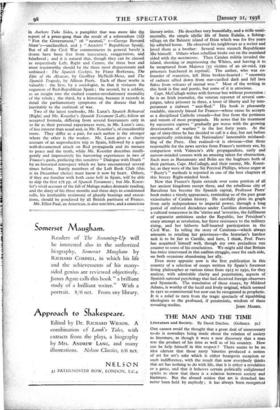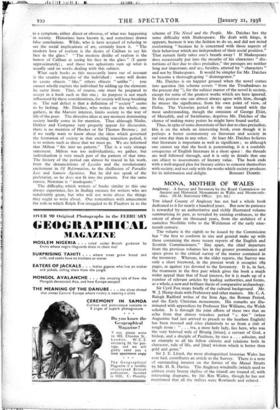. .
THE MAN AND THE TIME
Literature and Society. By David Daiches. (Gollancz. 5s.)
ONE cannot avoid the thought that a great deal of unnecessary tozdo is nowadays being made about the relation of society to literature, as though it were a new discovery that a man was the product of his time as well as of his country. How can he help himself in this respect ? -There seems to be an idea ctirrent that those nasty 'nineties produced a notion of art for art's sake which is either bourgeois escapism or snob indifference, with, the result that now everybody -thinks thit art has nothing to do with life, that it is either a revelation - or -a game, and that it behoves certain politically enlightened spirits to show that there is a relation between - society and literature. But the absurd notion that art is detached has never been held by anybody ; it has always been recognised
as a symptom, either direct or obverse, of what was happening in society. Historians have known it, and sometimes drawn false conclusions. Wilde, who is here accused of refusing to see the social implications of art, certainly knew it. " The modern love of realism is the desire of Caliban to see his face in the glass." " The modern dislike of realism is the horror of Caliban at seeing his face in the glass " (I quote approximately) ; and those two aphorisms sum up what is usually said on works dealing with this subject.
What such books as this necessarily leave out of account is the creative impulse of the individual : some will desire to create objects " like," others objects " unlike " : you cannot wholly explain the individual by adding up the elements he came from. That, of course, one must be prepared to accept in a book such as this one ; its purpose is not much influenced by these considerations, for society will keep breaking in. The real defect is that a definition of " society " seems to be lacking. Mr. Daiches, who writes on the whole, one gathers, in the Marxist interest, limits society to the way of life of the poor. The directive ideas at any moment dominating society hardly come in for mention. Thus although Nashe, Dekker and Company very properly appear for discussion, there is no mention of Hooker or Sir Thomas Browne ; yet if we really want to know about the ideas which governed the formation of society in that exciting transition period, it is to writers such as those that we must go. We are informed that Milton " fits inni no pattern." This is a very strange statement. Milton was too individualistic, we gather, but individualism is very much part of the pattern of that time. The history of the period can almost be traced in his work, from the denunciations of Lycidas and the revolutionary excitement in Of Reformation, to the disillusion of Paradise Lost and Samson Agonistes. But he did not speak of the proletariat, so he does not fit into the pattern. For the same reason, Newman is " inadequate."
The difficulty, which writers of books similar to this one always experience, lies fil finding excuses for writers who are indubitably great, but who will not write about the things they ought to write about. One remembers with amusement the toils in which Ralph Fox struggled to fit Flaubert in to the
scheme of The Novel and the People. Mr. Daiches has the same difficulty with Shakespeare. He dealt with kings, it appears; because it was the fashion to do so, and did not mind conforming " because he is concerned with those aspects of their behaviour which are independent of their social position." That remark fairly takes one's breath away ! If Shakespeare does occasionally put into the mouths of his characters " dis- tortions of fact due to class prejudice," the passages are neither long nor important, and ars-,., besides, uttered by " characters " and not by Shakespeare. It would be simpler for Mr. Daiches to become a thorough-going " disintegrator."
Mr. Daiches is on happier ground when the novel comes into question (his scheme covers " from the Troubadours to the present day "), for the subject matter of the novel is society, except for some of the greatest works which are here ignored. In this portion one can almost always agree with him, though he misses the significance, from his own point of view, of Defoe. The Victorian period is the one treated with the most understanding, though the omission of George EliOt, of Meredith, and of Swinburne, deprives Mr. Daiches of the chance of making many points he might have found useful.
Thus, in spite of some distortions of fact due to class prejudice, this is on the whole an interesting book, even though it is perhaps a better commentary on literature and society in our own day than in any other. At least Mr. Daiches believes that literature is important as well as significant ; so although one cannot say that the book is penetrating, it is a readable conspectus of English literature in a short space : the threads are well followed through, and it is only in details that one can object to assessments of literary valtie. The book ends with a well-argued plea for literary critics to concern themselves with society, and not only with the works which society produces
for its information and delight. BONAMY DOBREE.















































 Previous page
Previous page